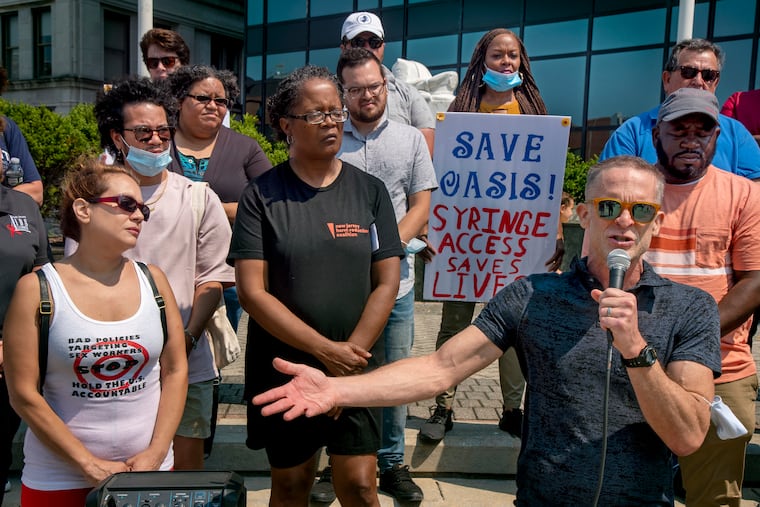New Jersey lawmakers understand that syringe service programs save lives. Why won’t Pennsylvania’s? | Editorial
For years, harm reduction activists, medical experts, and others have called on the General Assembly to make syringe services programs legal. Now Pennsylvania has a chance to finally get it right.

Phil Murphy’s pen was busy in the last few hours of the New Jersey governor’s first term. Ahead of his second inaugural address, Murphy signed 123 bills into law. Among the newly enacted measures was a bill to expand access to syringe services across the Garden State — a critical tool both to stem the spread of HIV and prevent overdose deaths that in New Jersey was mired in bureaucracy and in Pennsylvania is still illegal.
» READ MORE: A new law in New Jersey will expand access to clean syringes for drug users
Syringe services programs, at times called syringe exchanges, are a perfect example of the ways stigma can be more powerful than science. There are decades of evidence that providing access to sterile, unused syringes reduces the transmission of HIV and connects people to addiction treatment. Syringe services programs have been critical as hubs for the distribution of naloxone — the opioid overdose antidote — and harm reduction education. Studies also show that the distribution of syringes does not lead to higher rates of crime or promote drug addiction.
Despite those positive public health outcomes, states and municipalities all over America consider syringes to be “drug paraphernalia” and therefore illegal to possess or distribute. In states where syringe services programs are explicitly authorized, layers of red tape make establishing them extremely difficult.
That was the case in Atlantic City: Last summer, City Council members decided, in the midst of a pandemic and skyrocketing overdose death rates, to shut down the Oasis Drop In Center, one of only seven syringe services programs in New Jersey. The reason for the closure seemed to have nothing to do with public health or the efficacy of the center, which is operated by the South Jersey AIDS Alliance. Instead, activists, health experts, and other advocates for syringe programs attributed the council’s action to the stigma surrounding drug use in the city.
» READ MORE: Atlantic City is forcing its syringe program to shut down. What happened to ‘trust science’? | Editorial
The syringe access bill that Murphy signed into law gives Atlantic City a lifeline. Before the bill, entities that wanted to open a syringe exchange had to get approval from their municipality. Now they can apply directly to the state’s Department of Health — bypassing a few bureaucratic hurdles and sidestepping any potential NIMBY opposition.
In Pennsylvania, the legal status of syringe services programs is much more ambiguous. State law doesn’t allow them to operate, and handing out syringes is illegal (though it is legal to sell them at pharmacies). But since the early 1990s, a handful of syringe services programs have operated in Pennsylvania — one, Prevention Point, which is based in Kensington, was approved by an executive order signed by Mayor Ed Rendell in 1992 and has been openly conducting business ever since. Prevention Point Pittsburgh won a similar local endorsement, while a few others operate as more of an open secret.
For years, harm reduction activists, the leaders of the state’s schools of public health, and this board have called on the General Assembly to change the law and make syringe services programs legal. Now Pennsylvania has the opportunity to finally get it right.
Last fall, State Sens. Patrick M. Browne, a Republican from Lehigh County, and Anthony H. Williams, a Democrat from Philadelphia, introduced a bill to amend the Pennsylvania drug paraphernalia law to allow for the distribution of syringes across the state. The bill has the support of Gov. Tom Wolf.
» READ MORE: As activists rally in Harrisburg to legalize needle exchanges, a fight to keep them open continues in N.J.
Nationally, overdose death rates have been the highest ever recorded — a pace of 100,000 lives lost a year. At the same time, experts worry that a lack of HIV testing is masking the true number of new HIV infections in communities in Philadelphia. According to the Centers for Disease Control and Prevention, three Pennsylvania counties are at risk for an HIV and hepatitis C outbreak — Crawford, Luzerne, and Cambria. The White House is investing millions in harm reduction efforts through funding for syringes and strips to test substances for the presence of fentanyl, a potent synthetic opioid that is making its way to the supply of other drugs. Syringe services programs even save millions of dollars — an HIV test and a syringe are cheaper than the cost of lifelong medical care.
By finally amending Pennsylvania’s drug paraphernalia law, Harrisburg lawmakers can take a step that will benefit communities throughout the state and save lives. The only reason not to do so would be the stigma associated with drug use and harm reduction. New Jersey overcame that hurdle. Now it is Pennsylvania’s turn.